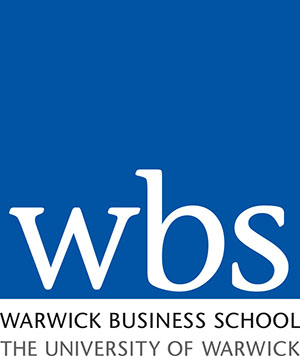- Learning
No More Business as Usual
A conversation with Tim Wray, Professor of Practice and Director of Executive Education at Warwick Business School
For business schools in particular there will be opportunities to help clients adapt to the post-crisis world, as well as challenges in designing and delivering effective learning in a radically altered environment.
However, as Tim Wray, Professor of Practice and Director of Executive Education at Warwick Business School points out, change was already afoot before the crisis―both in the demands and expectations of clients and in the way executive educators have been rethinking ways to create learning fit for an executive community increasingly peopled and led by digital natives.

Looking out at a skyline dominated by cranes and commercial building, Professor Wray wonders, “Will people have a fundamental rethink about the desperate need for more premises, when they've had experience of working in a truly remote context? Will they be rethinking travel? There is already a growing drum-beat around air travel, for example, and its impact on our climate.”
I think one of the final barriers has been the lack of experience of online activity. What's happening now is a mass experiment… everybody is being exposed to it.
Wray tells of one client who had projected having a capacity for 800 of their people to work remotely, but has found in the crisis they have been able to manage 5,000. “I think one of the final barriers has been the lack of experience of online activity. What's happening now is a mass experiment where suddenly everybody is being exposed to it. Even beyond the bounds of business it’s fascinating to see how community activity is happening on online platforms.”
All of this is likely to bring a fundamental shift in what clients need from business schools and how educators design and deliver executive learning. Although now greatly accelerated it will be a shift that is in line with changes already underway: a move to much more online and blended learning; greater emphasis on ‘people’ rather than ‘process’; and moves to put ‘purpose’ and responsible capitalism at the top of the corporate agenda.
Right now, as with the 2008 financial crisis, companies are focusing on their survival effort―what they need in this moment to address the fallout from the crisis. “I think this will go beyond the financial crash in terms of its impact,” says Wray. “At that time where people were looking at executive programs, it was hard issues around finance, restructuring, and survival. Now I think running alongside is that ‘purpose’ piece. It is interesting to see how some organizations will be judged to have treated their employees harshly and to have been nakedly commercial in their approach versus developing a more community-based approach to the crisis.”
People will ask: in the worst of times, how did you step up to the plate? How did you perform? What did your actions tell us about your values as an organization?
There is a sense of community, collective purpose and war-time spirit in the air and this is putting corporate reputation in the spotlight. “People will ask: in the worst of times, how did you step up to the plate? How did you perform? What did your actions tell us about your values as an organization? And I think that will live long in the memory post the crisis.”
Beyond the short term, the most obvious impact the crisis will have on executive education will be the drive to more online delivery. “I suspect that there will be no turning back,” says Wray. “The days of long, face-to-face programs are probably over. I think programs will be very much blended, short, face-to-face workshops with much longer segments that are online.” Wray quotes another client, a large global professional firm, that in a recent conversation about a blended program asked him: what would a fully online program look like?
The days of long, face-to-face programs are probably over.
For Wray, two further factors militate towards more blended and online learning. First the call from clients―at a time when many executives feel time-poor―not just to deliver value for money, but also ‘value for time’. Secondly, while current leaders may believe that the all-important social and networking aspect of an executive program cannot be effectively delivered online, in ten years’ time, when today’s twenty-year-old digital natives are moving into executive roles, this belief is unlikely still to hold.
Warwick Business School is in a good position to adapt to this changing environment. Its global distance learning MBA is ranked #1 by the Financial Times. “Our online capability is well established,” says Wray. “We have our own proprietorial platform with a very large team supporting and crafting it, both from a teaching and a technology perspective; with our own design and recording studios etc. We have several thousand people right across the globe engaged in our online distance learning MBA at any one time. And we've now imported that technology and capability into the delivery of our executive education programs, particularly on the customised side.”
“Many of our programs are blended, and increasingly we have seen a trend where the workshops become important pivot points in the program. You may have significant tranches of online learning, which will include reading, videos, and all sorts of online resources. And then the short one or two-day workshops become critical. The online delivery enriches the workshops because people have covered so much of the material in advance, and the conversation can go much deeper, and the learning more significant as a result. Then when people meet online, the relationships are already there to underpin the online interaction which enables the whole thing to take off.”
We can decongest cities if people can work easily from home and they can do that if the technology is available.
Asked if the technology is up to the challenge, Wray believes that while it is still evolving it is already there in terms of the School’s delivery capability. There are questions around the quality of broadband connectivity to consider, particularly outside of major cities. Investment in broadband infrastructure is a broader economic priority and an enabler in terms of climate change. “We can decongest cities if people can work easily from home and they can do that if the technology is available. I suspected somewhere along the line that the broadband infrastructure in particular will be seen in the same way that water and electricity have been in previous years. There's just essential infrastructure that needs to be right across the country.”
In considering the main areas of focus for Executive Education, Wray points to the findings of Warwick’s recently published Organizational Learning Report 2020, which will inform how the School adapts to meet clients’ changing needs. The priorities expressed by participants fell into three broad areas: strategy execution, leadership and digital capability. Compiling the report, the research team spoke to two populations: HR and L&D professionals, as well as to a wider population of executives. There was a lot of overlap; strategy execution, organizational change, and leadership surfaced with both populations. But it was interesting that the HR and L&D professionals didn't have digital capability on their list at all, whereas it was top of the list by far for the executives―with 45% of senior managers saying digital leadership capability was a key thing for them personally. With the growing importance of data analysis in decision-making and the increasing use of machine learning and AI perhaps this is unsurprising.
In the same way that non-finance trained business leaders have needed to understand the fundamental dynamics of finance, today’s leaders need to understand, not the fine technical details, but the essential capabilities of machine learning and AI to be able to set strategy and grasp the opportunities of the digital era. The Executive Diploma in Digital Leadership is just one of the ways Warwick is addressing this need.
Enhancing digital understanding is one of three lines of development Wray is pursuing at Warwick. Another is around behavioural science. “We are looking at how behavioural science provides insights on things like executive decision making, culture change, behavioural economics, negotiations and so on.” Behavioural Science in Practice is Warwick’s flagship program in this area―an area where the School has a genuinely world class group of experts. The third area is online delivery. “We have the distance learning MBA which is hugely important for us, but leveraging that capability into more non-accredited executive offerings is definitely something you'll see from us over the next 12 months,” says Wray.
Along with this comes one of Warwick’s traditional strengths: custom programs. “Custom work is critically important for us as it’s an area of significant growth…. A key deliverable for us in this area is in innovation and design. We've talked about things like the use of online and blended, which is one form of innovation, but how we use the creative arts, for example, in what we do, how we use discovery visits and different non classroom based creative and innovative ways of engaging executive learning.”
The ability to demonstrate real impact and real value for clients is hugely important, more so than ever before.
Asked about the future challenges facing Executive Education at the School, Wray cites two key issues. First the challenge of uncertainty presented both by the current COVID-19 crisis and the economic downturn that is sure to follow, and by the fast-changing business landscape of the digital world. Secondly, he mentions the highly competitive nature of the executive education market and the challenge to demonstrate value. “The ability to demonstrate real impact and real value for clients is hugely important, more so than ever before.” To address these challenges Wray believes innovation and experimentation are essential for the School as well as its clients. “I think you no longer plan your way to the future, you've got to learn your way to the future.”
In this rapidly changing and disrupted world there are also enormous opportunities for executive educators to make a difference. For example, with so much greater digital capability there is the opportunity to spread executive education much deeper into organizations, to reach a broader range of businesses, to democratise learning, and to truly enhance knowledge sharing and collaboration.
Warwick Business School is a leading thought-developer and innovator, in the top one per cent of global business schools.
ARTICLES YOU MIGHT LIKE
VIEWPOINT
A conversation with Professor Kenneth Corts of the Rotman School of Management
DEVELOPING LEADERS QUARTERLY MAGAZINE AND WEEKLY BRIEFING EMAILS


































